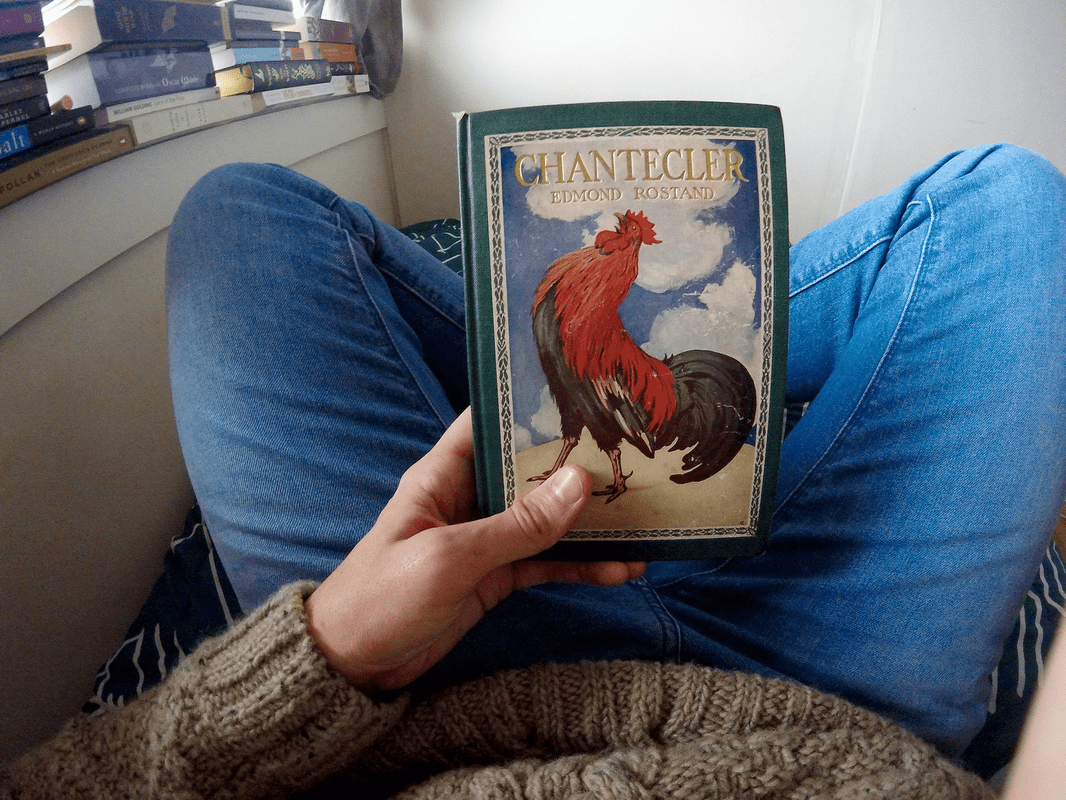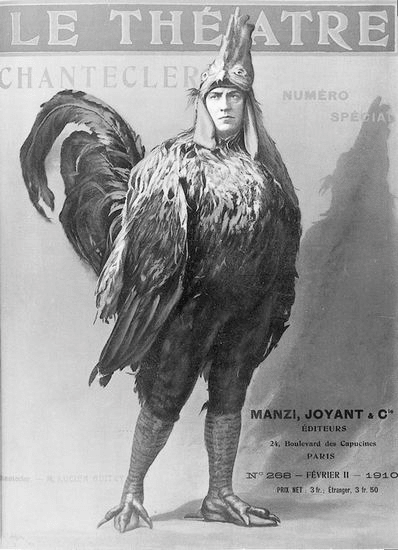"I think of light and not of glory!"
— Chantecler
STORY
In Chantecler, we meet a rooster who lords over the hens and other farm animals with a sincere conviction in his own importance. After all it's he, Chantecler, who causes the sun to rise with his "crimson cry" every morning. The Blackbird, has named him "The Grand Master of Illumination," because his Cock-a-Doodle-Doo awakens the whole farm, the surrounding forest, and the entire valley from night.
But Patau, the farm dog and best friend of Chantecler warns him that Blackbird is insincere: "Be not deceived by [the blackbird's] size! Evil makes his models first on a tiny scale. The soul of a cutlass dwells in the pocket-knife; blackbird and crow are the same...and the striped wasp is a tiger in miniature."
Chantecler dismisses Patau's warnings, unable to conceive of someone being so insincere and artificial. Soon though, we learn that Blackbird is in fact the orchestrator of a conspiracy to assassinate the rooster. The owls, the cats, and even some of Chantecler's own hens, secretly hate his idealistic attitude and sense of self-importance.
As the plot unfolds, the 4 Act play is cleverly structured into two days and two nights, during which Chantecler becomes increasingly aware of the insincerity of his friends, of their disguised hatred for his heroic stature, and his desire to be heroic. In the story's brilliant climax, situated in the farm's surrounding forest, our hero must confront and question his core belief: does he cause the sun to rise? And if not, do heroes still exist?
But Patau, the farm dog and best friend of Chantecler warns him that Blackbird is insincere: "Be not deceived by [the blackbird's] size! Evil makes his models first on a tiny scale. The soul of a cutlass dwells in the pocket-knife; blackbird and crow are the same...and the striped wasp is a tiger in miniature."
Chantecler dismisses Patau's warnings, unable to conceive of someone being so insincere and artificial. Soon though, we learn that Blackbird is in fact the orchestrator of a conspiracy to assassinate the rooster. The owls, the cats, and even some of Chantecler's own hens, secretly hate his idealistic attitude and sense of self-importance.
As the plot unfolds, the 4 Act play is cleverly structured into two days and two nights, during which Chantecler becomes increasingly aware of the insincerity of his friends, of their disguised hatred for his heroic stature, and his desire to be heroic. In the story's brilliant climax, situated in the farm's surrounding forest, our hero must confront and question his core belief: does he cause the sun to rise? And if not, do heroes still exist?
WHY I LOVE IT
Rostand's Chantecler is a lightning-paced, colorful story about the heroism in one's own soul. Through an enormous cast of farm and forest animals, we meet many shades of heroes and villains, exploring their inner motivations for wanting to be heroic or to kill heroism.
The many animals who do want to kill Chantecler are really striking against their own heroic potential. Rostand explores this in Act III with the twenty roosters who have come from the four corners of the world to "see blood." They've neglected their Cock-a-Doodle-Doos, and focused instead entirely on appearance, on their combs (the red skin atop a rooster's head), the color of their feathers, and strutting about. It's this focus on the inessentials that Chantecler renounces, likening the charlatans to the farm's scarecrow, who are only made to appear living with the passing winds of Fashion, but are actually dead and empty. A rooster's true path to heroism, Chantecler proclaims, is his song — his "life's work," not his appearance.
Moreover, Chantecler is a criticism of modern art (modern to Rostand — late 19th, early 20th century). Naturalism's dismissal, if not contempt for heroism in art, and perhaps also a focus on style without substance is satirized throughout. Rostand was an unabashed Romantic, who sought to depict heroes and villains; moral and philosophical ideas that are timeless and univeral. The photo above is a First Edition that I found on Amazon for $7. It was published in 1910, over a century ago, but the story is entertaining, witty, tragic, and I think just as relevant today. Rostand and heroism win. {JG}
The many animals who do want to kill Chantecler are really striking against their own heroic potential. Rostand explores this in Act III with the twenty roosters who have come from the four corners of the world to "see blood." They've neglected their Cock-a-Doodle-Doos, and focused instead entirely on appearance, on their combs (the red skin atop a rooster's head), the color of their feathers, and strutting about. It's this focus on the inessentials that Chantecler renounces, likening the charlatans to the farm's scarecrow, who are only made to appear living with the passing winds of Fashion, but are actually dead and empty. A rooster's true path to heroism, Chantecler proclaims, is his song — his "life's work," not his appearance.
Moreover, Chantecler is a criticism of modern art (modern to Rostand — late 19th, early 20th century). Naturalism's dismissal, if not contempt for heroism in art, and perhaps also a focus on style without substance is satirized throughout. Rostand was an unabashed Romantic, who sought to depict heroes and villains; moral and philosophical ideas that are timeless and univeral. The photo above is a First Edition that I found on Amazon for $7. It was published in 1910, over a century ago, but the story is entertaining, witty, tragic, and I think just as relevant today. Rostand and heroism win. {JG}
FAVORITE QUOTES
{ * } "Whoever speaks of stars today must lower his voice." — Patau, Act I
{ * } "Oh, be not deceived by [the blackbird's] size! Evil makes his models first on a tiny scale. The soul of a cutlass dwells in the pocket-knife; blackbird and crow are the same...and the striped wasp is a tiger in miniature." — Patau, Act I
{ * } "Praise the Night, convenient, secret, when in slaughtering baby rabbits we can do it at our ease, daub the grass with blood in comfort, spare the pains to look a hero, be ourselves where no one sees." — Blackbird, Act II
{ * } "My eye is merely roguish. I am here to look on, you know, without taking sides — in the artist spirit, that's all." — Blackbird, disguising his hatred, Act III
{ * } "Black excites me, as red excites the bull, and thrice I have stared at night in the form of a bird's shadow." — Chantecler, Act IV
{ * } Pheasant Hen: How do I look?
Chantecler: Like a living commandment ever to worship...
{ * } "But you, who, void of gaiety because void of love, have imagined that evil wit can take the place of good humor." — Chantecler, Act IV
{ * } "You serve up stale old cynicisms proceeding with crumbs in fashionable club-rooms, poor little bird, and think to astonish us with your loudest of scandalous news." — Chantecler, Act IV
{ * } "False hero whom Fashion has taken for leader, you walk in such terror of appearing behindhand to the eyes of your own tail that your throat is blue with it! But, urged forward, on and on, by every staring eye upon it, you will fall at last, breathless for good and all, and and in the false immortality bestowed, false artist, by the...Taxidermist." — Chantecler, Act III
{ * }"The evil race of man loves to shower lead into a singing tree." — Patau, Act IV
{ * } "Chantecler: Oh, to be a sound that soothes and lulls!
The Nightingale: To be a splendid call to duty!
Chantecler: I make nobody weep!
The Nightingale: I awaken nobody!"
{ * } “I love you, but I should poorly serve the work to which I devote myself anew at the side of one to whom it were less than the greatest thing in the world!" — Chantecler, Act V
{ * } "Oh, be not deceived by [the blackbird's] size! Evil makes his models first on a tiny scale. The soul of a cutlass dwells in the pocket-knife; blackbird and crow are the same...and the striped wasp is a tiger in miniature." — Patau, Act I
{ * } "Praise the Night, convenient, secret, when in slaughtering baby rabbits we can do it at our ease, daub the grass with blood in comfort, spare the pains to look a hero, be ourselves where no one sees." — Blackbird, Act II
{ * } "My eye is merely roguish. I am here to look on, you know, without taking sides — in the artist spirit, that's all." — Blackbird, disguising his hatred, Act III
{ * } "Black excites me, as red excites the bull, and thrice I have stared at night in the form of a bird's shadow." — Chantecler, Act IV
{ * } Pheasant Hen: How do I look?
Chantecler: Like a living commandment ever to worship...
{ * } "But you, who, void of gaiety because void of love, have imagined that evil wit can take the place of good humor." — Chantecler, Act IV
{ * } "You serve up stale old cynicisms proceeding with crumbs in fashionable club-rooms, poor little bird, and think to astonish us with your loudest of scandalous news." — Chantecler, Act IV
{ * } "False hero whom Fashion has taken for leader, you walk in such terror of appearing behindhand to the eyes of your own tail that your throat is blue with it! But, urged forward, on and on, by every staring eye upon it, you will fall at last, breathless for good and all, and and in the false immortality bestowed, false artist, by the...Taxidermist." — Chantecler, Act III
{ * }"The evil race of man loves to shower lead into a singing tree." — Patau, Act IV
{ * } "Chantecler: Oh, to be a sound that soothes and lulls!
The Nightingale: To be a splendid call to duty!
Chantecler: I make nobody weep!
The Nightingale: I awaken nobody!"
{ * } “I love you, but I should poorly serve the work to which I devote myself anew at the side of one to whom it were less than the greatest thing in the world!" — Chantecler, Act V
ABOUT THE AUTHOR
Edmond Rostand (1868 - 1918) was a French poet and dramatist, best known for his play Cyrano de Bergerac (1897, my rec here). I've read now his two most famous works, and see in both the author's grand view of life and its possibilites, a focus on the importance of sincerity, and how insincerity, even on a small scale leads to ruin. I love this guy — and Rostand loved Victor Hugo, whose novels are some of my favorites.
I'm trying to track down some of Rostand's other works: The Red Glove, The Romancers, and The Princess Far Away. If you find any copies online, please let me know. Haven't found them on Amazon, Half.com and Ebay.
I'm trying to track down some of Rostand's other works: The Red Glove, The Romancers, and The Princess Far Away. If you find any copies online, please let me know. Haven't found them on Amazon, Half.com and Ebay.
OTHER POSTS YOU MAY LIKE
{*} Cyrano de Bergerac by Edmond Rostand {My Rec}
{*} Fire Bringer by David Clemente-Davies {My Rec}
{*} Ninety-Three by Victor Hugo {My Rec}
{*} The Books of Huckberry: Summer 2016
{*} The Best Books I Read In 2016
{*} Fire Bringer by David Clemente-Davies {My Rec}
{*} Ninety-Three by Victor Hugo {My Rec}
{*} The Books of Huckberry: Summer 2016
{*} The Best Books I Read In 2016
| Chantecler debuted on stage in Paris is 1910, and the following year on Broadway. If you hear about any performances, please let me know! |




















